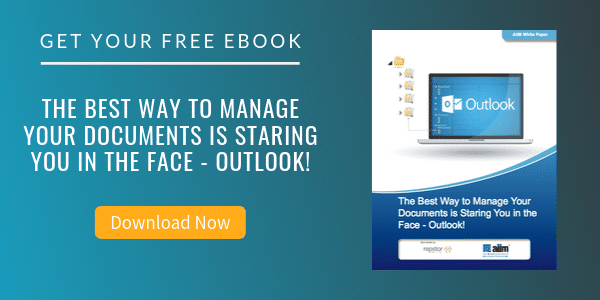
8 MORE Reasons Why World Paper Free Day Matters
I did a post a while back on 8 Reasons Why World Paper Free Day Matters. That data was drawn from our 2015 survey. Well, here's eight more from this year's research report, 2016 Paper Free: Are We There Yet?
Since the 1980s, we have heard about paper-free businesses and the drive to move toward a more digital workplace. At the time, technology and people were not ready for this transformation. Today, the approach to digitally transform businesses has shifted from a technology-first perspective to a more business-centric approach, with paper-free processes becoming a focal point and opportunity for many organizations.
Yet despite widespread acceptance that reducing and removing paper is a best practice, we find that only twenty-five percent of our 2016 Paper Free: Are We There Yet? respondents indicate they run a clear/paper-free environment; the good news is that this figure is up from 18% in last year’s report. Discouragingly, 65% of our respondents say they are still signing on paper, even though there is a wide and growing acceptance of digital and eSignature technology.
Despite this, and the fact that paper is still a somewhat dominant media in business, we see a 3% increase over the 2015 report, with 40% of our 2016 respondents indicating they have a number of paper-free processes and will do more in the future. It is obvious that while interest and motivation toward a paper-free business environment are increasing, there is still a long road ahead. The human factor is still the primary reason for paper use in handling, reading, and note taking (47%). While benefits are acknowledged, and interest seems to be growing, there is still a lack of management initiatives to move away from paper (47%). Our respondents also cite a lack of understanding and awareness when it comes to paper-free options (39%), indicating a need for education on how to approach and initiate a paper-free project.
Why World Paper Free Day Matters
-
The amount of paper arriving at the door is decreasing somewhat (41%) to rapidly (9%). Digital inbound documents are increasing somewhat (47%) to rapidly (19%).
-
Demand for paperless communications is somewhat on the rise for 46% of respondents, while 19% are seeing a rapid increase in demand. Thirty-eight percent of respondents say that they now receive more digital invoices than those in paper form.
-
Fourteen percent of respondents have a distributed, multi-channel approach across paper and digital content – up slightly over 2015. For 29%, things are adhoc in relation to scanning, which is down slightly over 2015.
-
A hybrid approach of centralized and distributed capture is in place for 29% of respondents. 18% cite the use of centralized capture with multiple desktop scanners, and an additional 18% cite the use of distributed capture at their branch offices.
-
Forty-one percent of respondents report better quality in downstream data capture and faster-post-box to in-box times equally. For 37%, there are equally fewer operational staff and faster turnaround times for customers.
-
Responsibility for radical process review falls on the line-of-business or department head, according to 26% of our respondents. It is the top-level executive who is responsible for radical process review in 22% of respondent organizations.
-
When it comes to converting key business processes, Accounts Payables (AP) is the top priority according to 30% of respondents. For 27%, it is Accounts Receivables (AR) and Records Management—cited equally.
-
Dedicated workflow/BPM capabilities are in place for 7% of our respondents – up slightly over 2015. 36% of respondents say they have a combination of paper and digital content in the same workflows.
Case Studies: Learn from these Paper-Free Heroes
About Bob Larrivee
Bob is the President and Founder of Bob Larrivee Consultancy. An internationally recognized Subject Matter Expert and thought leader with over thirty years of experience in the fields of information and process management, Bob is an avid techie with a focus on the application of advanced technologies to enhance business operations.



